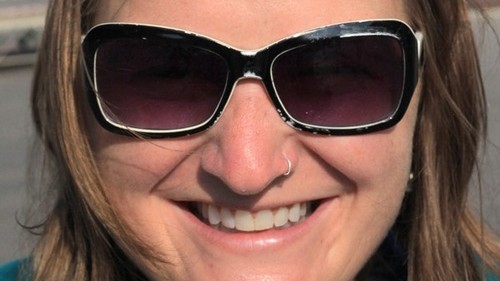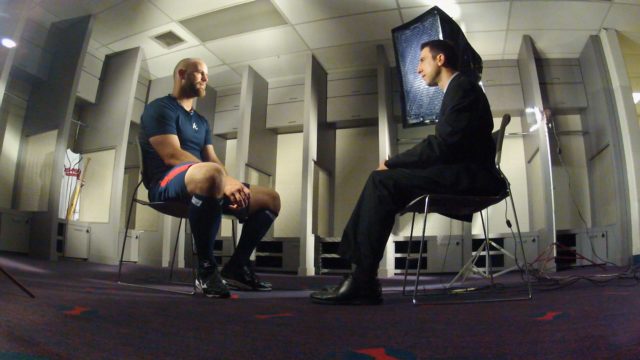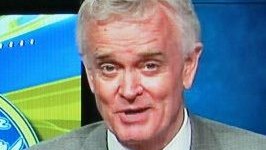In May 2013 I was assigned to tell the story of Atlanta Braves’ slugger Evan Gattis. It took me on a two-day journey across the state of Texas.
This is Part 1 of the story of that journey. To read the entire story on a single page, CLICK HERE.
*****
Snooze.
I woke up to the sound of muffled radio static on the alarm clock in my hotel room. I had not bothered to find a station before I went to sleep the previous night; I was exhausted, and I doubted I would miss much by scanning the AM dial for Abilene, Texas’ finest. Plus, I knew I would not be listening for very long when I awoke.
Instead, I did the first thing I could think of: reach over and hit the button on top of the radio.
Snooze.
I did not intend to go back to sleep, of course. I couldn’t. I was up for a reason: to drive ten hours, in one day, to interview two people, both of whom were integral to the life of Atlanta Braves catcher Evan Gattis. A month earlier, Gattis made the Braves’ Opening Day roster as a 26-year-old rookie. Two weeks after that, he was named National League Rookie of the Month.
But that was not what sent me to Texas. I had arrived in America’s second-largest state to shine the spotlight on Gattis’ other claim to fame, the story that had captivated Braves fans in Atlanta and baseball fans across the country. After completing high school and committing to Texas A&M as a highly-touted prospect, Gattis left the game and did not return for half a decade. In the meantime, he traveled the state and the country, working odd jobs at golf courses, ski resorts, and even Yellowstone National Park. He followed a spiritual advisor to New Mexico, and he lived like a nomad, on a search for purpose and identity. Gattis had gone on a journey, to be sure, and came out of it a Major League baseball player.
How fitting, then, that I would have to take a journey of my own to properly tell his story.
I got up out of bed in that Abilene hotel room and took a shower. When I got out, I heard those muffled AM sounds again. I walked over, looked at the clock on the radio, and saw a time I generally only saw during the daytime.
4:44.
I wanted to hit Snooze again. But not this time. It was time to hit the road.
*****
A day earlier I had awoken at technically the exact same time. In this case I had gotten up at 5:44, but I was still on the Eastern Time Zone, at my apartment in Atlanta preparing to leave for the airport. This in itself felt like a big step. My trip to Texas was the culmination of roughly a month’s worth of planning – and nearly an equal amount of frustration – with Gattis’ story.
The news managers at my TV station, Atlanta’s NBC affiliate WXIA-TV, had decided back in April they wanted me to do an in-depth story about Gattis. It was a no-brainer, really; they had heard about Gattis’ improbable journey, watched his hot start for the Braves, and believed his story would be great for our big ratings period in May. I reached out to the Braves’ media relations team multiple times but did not hear back; finally I decided to meet Gattis myself, heading to the clubhouse for post-game interviews and introducing myself to the slugger at his locker. I told him we wanted to tell his story and even head to Texas to talk with his dad Jo, who played a huge role in Gattis’ growth both personally and professionally. Gattis gave the OK and simply asked that we go through the Braves’ media relations folks to reach his father.
Done, I said.
Over the next few weeks I sent roughly a dozen e-mails to the Braves’ PR person assigned to these types of requests. I found I could not even secure an interview with Gattis, let alone his dad. The Braves were only home for a week in late April, and numerous national media outlets had come knocking with a similar request to interview the catcher, who by this point had developed a Jack Bauer/Chuck Norris-like mystique among the team’s fans. I would have to wait until their next homestand, I was told. And what of Gattis’ dad? I heard very little.
Finally, my managers and I got tired of waiting. We wanted to tell Gattis’ story, and we no longer wanted to delay until the Braves’ media folks got around to us. “Head down to Dallas,” I was told. “Set up whatever interviews you can, and we’ll make it work.”
I spent last Monday and Tuesday making calls and developing contacts with people who had watched Gattis grow. I called his youth coach in Dallas and his college coach in Odessa; they jumped at the chance to talk about someone for whom they held great admiration. I connected with the Texas-based scout who recommended Gattis to the Braves; I got a hold of the machine shop owner who briefly hired Gattis during his time away from the game.
I even found his spiritual advisor in New Mexico. She declined my request.
(more…)


